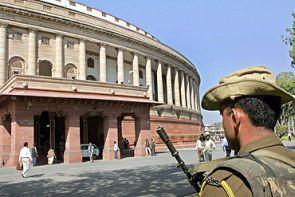 A landmark bill to replace the collegium system of judges choosing judges was on Thursday passed in the Lok Sabha after government dropped a controversial provision that required unanimity in recommendation if the President seeks reconsideration.
A landmark bill to replace the collegium system of judges choosing judges was on Thursday passed in the Lok Sabha after government dropped a controversial provision that required unanimity in recommendation if the President seeks reconsideration.
The National Judicial Appointments Commission Bill, 2014 was passed by voice vote without any opposition after Law Minister Ravi Shankar Prasad accepted a Congress demand and moved an official amendment.
The amendment dropped the provision requiring unanimity in the Commission's recommendation if President had referred the earlier recommendation back to the collegium for reconsideration.
The official amendment, moved by Prasad, said that if the President returns the recommendation of the Commission, the panel will not have to return the recommendation for reconsideration "unanimously". If the recommendation is returned to President without a unanimous recommendation, the candidate will have to be appointed.
Congress member and former Law Minister M Veerappa Moily, during the debate, had raised the issue and demanded the droppoing of the proposal. The Opposition felt that under he original provision of unanimity even one member can veto the commission's recommendation.
Along with the NJAC bill, the 99th Constitution Amendment Bill, which seeks to confer Constitutional status to the proposed Commission, was passed by 367 in favour and none against.
nder the statute amendment bill, Chief Justice of India will head the NJAC. Besides the CJI, the judiciary would be represented by two senior judges of the Supreme Court. Two eminent personalities and the Law Minister will be the other members of the proposed body.
While two members of the NJAC can veto any appointment, the government can return the recommendation for "reconsideration". Under the now-dropped provisions once then NJAC "unanimously" reiterates the recommendation, the government has no option but to accept it.
Piloting the bills, Prasad asserted that the measures were aimed at ensuring that only meritorious people are selected as judges to the higher judiciary. He maintained that the proposed law does not impact upon the independence of the judiciary. The new law will provide for wider consultations for appointment of judges to the Supreme Court and high courts.
"We are for maintaining the sanctity of the judiciary... We have said this House respects independence of judiciary. That should be assuring," he said, allaying apprehensions that new law would curb the independence of judiciary.
Seeking support of all parties, he said, "Let the message go that this House is one for maintaining dignity of the judiciary."
Suggesting that the existing collegium system of judges appointing judges had flaws, the Minister said many good judges could not make it to the Supreme Court. Under the new law where a commission will decide appointment of judges to Supreme Court and high courts, seniority along with "ability" and "merit" will be considered for elevation, Prasad said.
He defended the "veto" power of any two members, saying that the provision is part of the present collegium system also. "We have made consultations more meaningful," he added.
Rejecting the demand for a state-level judicial appointment commission, Prasad said Article 124 makes it clear that only the President can appoint judges to Supreme Court and the 24 high courts and it will be vulnerable to withstand scrutiny.
Justifying the strength of the commission to be six in the face of questions over the figure, he said the number has been decided on the basis of sum and substance of the recommendations of various commissions which have looked into the utility of the collegium system and earlier bills.
He said members of Parliament should trust the "collective wisdom" of the commission to elect the best of people from among judges and lawyers. He said he would work towards creation of a data bank of lawyers and judges whose names could be recommended for elevation by the commission.
After any Constitutional amendment bill gets Parliamentary nod, it is sent to all the states and 50 per cent of the state legislatures have to ratify it. The process could take up to eight months. After ratification, the government sends it to the President for his approval.
The practice of judges appointing judges started after 1993, replacing the system of government picking judges for higher judiciary comprising the Supreme Court and high courts.
An earlier effort by the National Democratic Alliance-I government in 2003 to replace the collegium system met with no success. The then NDA government had introduced a Constitution amendment bill but Lok Sabha was dissolved when it was before a standing committee. The United Progressive Alliance II had also brought a similar bill but without success.
Also, for the first time in 10 years, the prime minister voted in the Lok Sabha on Wednesday. Narendra Modi participated in the voting on the Constitution amendment bill to scrap the collegium system of judicial appointments.
His predecessor Manmohan Singh could not vote in the Lower House as he was a member of the Rajya Sabha throughout his tenure. The voting on the historic bill was also an affair with a difference as it was carried out using the old system of slips since division numbers have so far not been allotted to members in the wake of reported reservations in the Opposition camp to sit next to the Congress.
The process took a longer time than it usually takes as due to non-allocation of division numbers, the electronic voting system could not be used. Incidentally, Congress President Sonia Gandhi and Rahul Gandhi were not present during the voting.
The Congress chief was present earlier during the election of deputy speaker when Rashtriya Janata Dal member Rajesh Ranjan alias Pappu Yadav utilised the presence of Modi to drive home the point that he should also show a large heart to ensure leader of the opposition post went to the Congress.











 © 2025
© 2025